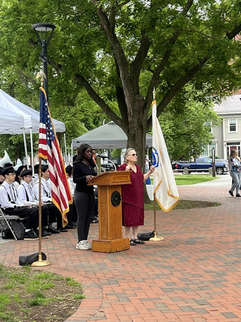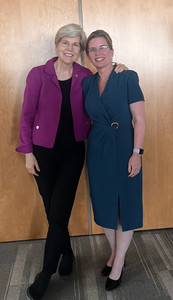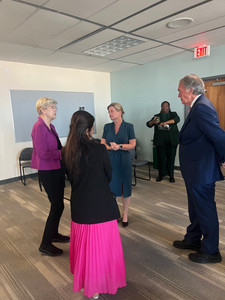Friday, May 31st Legislative & Public Health Updates
- hannanur3
- Jul 16, 2024
- 10 min read
Updated: Aug 5, 2024
Dear friends,
I am writing to you today with legislative, public health, and Cambridge updates. Thank you for your patience; our newsletter was delayed a day because of the Poverty Commission hearing in Springfield yesterday.
Table of Contents
Legislative Updates
Public Health Updates
A Glimpse at the Past Week
Cambridge Updates
Services and Resources
Legislative Updates
First Poverty Commission Hearing
On Thursday afternoon, Senator Sal DiDomenico and I convened the first public hearing of the Massachusetts Poverty Commission. As I mentioned in a previous newsletter, we were tasked by the Senate President and Speaker of the House, respectively, to co-chair the Commission based on our history of leadership on anti-poverty legislation in the State House. The Commission is charged with creating a set of recommendations that would significantly reduce poverty in the Commonwealth over the next 10 years. The Commission is composed of over 30 individuals representing state agencies, anti-poverty nonprofits, and academic institutions who will work with us to come up with the recommendations.
The first hearing was held at American International College in Springfield, focusing on the Western and Central regions of the state. I was grateful to hear oral testimony from organizations and individuals doing anti-poverty work in the region, learning what was working to alleviate poverty, barriers they continue to face, and generally about the geographic-specific context. Thank you to everyone who came to testify. You can watch a recording of the hearing on the Legislature’s website here.
Public Health Updates
H5N1 Bird Flu mRNA Vaccine in Development
Researchers at the University of Pennsylvania’s Perelman School of Medicine in Philadelphia have developed an experimental mRNA vaccine to fight against the H5N1 bird flu virus according to a UPenn press release. The research suggests that the vaccine is highly effective in preventing death and severe illness in lab animals, which could help combat current outbreaks in wild birds, poultry, and cows in the U.S. and can help prevent the virus from eventually spreading to humans. The United States currently maintains a stockpile of vaccines against various influenza strains, including types of bird flu, in case of pandemic under the National Pre-Pandemic Influenza Vaccine Stockpile (NPIVS) Program, and the U.S. is currently accepting proposals for mRNA vaccines to add to the reserve. Unlike other types of vaccines, mRNA vaccines are both easier and quicker to make because their formulas are easily adapted to fight various types of viruses; mRNA technology allows scientists to develop vaccines within hours of sequencing a new viral strain. Plus, the development and use of mRNA vaccines to fight COVID-19 have helped to provide a basis for H5N1 and future viruses. While the experimental UPenn vaccine may be highly effective in lab animals, more work is likely needed to produce a vaccine for FDA approval. Not only is it notoriously difficult for H5N1 viruses to produce immune responses, mRNA vaccines tend to have unpleasant side effects, particularly at higher doses. As such, developing an mRNA H5N1 vaccine that is both effective and tolerable to receive could prove to be difficult.
Combined Sewer Overflows Increase Risk of Hospital Visits near Merrimack River
A Boston University School of Public Health study has found that people living in communities along the Merrimack River have an increased risk of developing acute gastrointestinal illnesses in the days after large combined sewer overflows (CSOs). CSOs occur during heavy rain, releasing untreated wastewater into waterways. Many communities in Massachusetts, including Boston, Cambridge, Lynn, and Haverhill, have utilized combined sewer systems since the systems were installed in the mid-1800s. Normally, CSOs don’t occur; the system is built to allow stormwater runoff and sewage to flow through a single pipe to a treatment facility. However, when moderate or heavy rainstorms occur, the systems can be inundated with excess flows. Combined systems are designed to empty overflow into waterways, rather than allowing sewage to back up into homes. As climate change increases the number of storms that cause CSOs, the risk of illness caused by sewage-related pathogens increases. The research suggests that large CSOs increase the risk of emergency room visits by 22% and very large CSOs increase the same risk by 62%. The Merrimack River is a source of drinking water in Massachusetts and, while there is a risk of gastrointestinal illness in communities that drink water sourced from the Merrimack, this risk is not higher. Exposure to sewage-related illnesses can also occur through other methods, like engaging in recreational activities in or near the river. Public health officials recommend waiting at least 48 hours after a CSO to swim, boat, or allow pets into affected water. State law requires cities and towns to notify residents of an overflow within two hours, but members of the public can track sewage overflows into Massachusetts waterways in real time here.
New Research Reveals Connection Between Heat Exposure and Preterm Deliveries
Researchers have found that heat waves are associated with an increased risk for preterm and early delivery, underscoring how progressing climate change exacerbates existing health inequities. This study analyzed data from 53 million births between 1993 and 2017. This sample size represents over half of the births across the United States during that period. In the days following heat waves, researchers found over 2 million preterm births between 28 and 37 weeks gestation and nearly 6 million early births between 37 and 39 weeks gestation. These data represent a 2% and 1% increase in preterm and early births, respectively. However, birthing people of color, particularly those who were 29 or younger and had lower education levels, experienced a 4% increase in preterm births and a 3% increase in early births, a clear maternal health inequity. Marginalized birthing people are already at a higher risk for giving birth early, regardless of heat exposure. Given that preterm birth is the second-leading cause of infant mortality in the U.S. and the third-leading cause of infant mortality globally and that the Earth’s climate is warming at an unprecedented rate, the results of this study are especially concerning. Researchers have not yet identified the physiological reactions exposure to heat causes in pregnant people that result in premature delivery.
Epidurals Shown to Reduce Complications After Childbirth
A new study released last week shows that women who receive an epidural during delivery may experience fewer serious complications in the weeks after giving birth than those who do not. Researchers have reported that the risks of complications stemming from delivery such as heart attack, heart failure, blood infection, and hysterectomy are decreased by 35% in women who receive an epidural. The risk declines even more in women with known risk factors to those complications; epidurals reduce risks of complications in women with obesity, other health problems, or prior deliveries by 50%. Results also show that epidurals can reduce the risk by 47% in women delivering preterm. Epidurals are both the most common and the most effective form of pain management during labor. However, only 22% of study participants received an epidural and approximately 25% of participants with the highest risk of complications got an epidural. This phenomenon may be attributed to common misperceptions of the safety and usefulness of the procedure - high risk of nerve damage to the mother and risks of birth defects are common myths associated with epidurals. Additionally, research suggests that race inequality exists in both epidural use and failure of regional anesthesia in labor. White women receive epidurals more often than those from other racial and ethnic groups; women of color are more likely to experience pain medication failure but are less likely to have their pain and anxiety taken seriously by doctors during labor. Results of the study support current practices of recommending epidurals to women with known risk factors, ensuring equitable access to the procedure and other forms of pain management treatments, and supporting women from diverse backgrounds in making informed decisions regarding pain management during labor.
Takeda Pharmaceutical Announces 641 Layoffs in Massachusetts
Last week, Takeda Pharmaceutical confirmed plans to lay off 641 employees in Massachusetts between July and next March. Takeda’s U.S. headquarters is located in Cambridge and the company is the largest drug maker in Massachusetts by headcount. In 2023, Takeda employed over 6,000 people in the Commonwealth which, at the time, was more than any other company in Massachusetts’ biopharma sector. According to a filing with the Executive Office of Labor and Workforce Development, approximately 495 employees in Cambridge and 146 in Lexington will be affected by the layoffs. This announcement comes less than a month after the company announced that it would embark on a $900 million restructuring campaign, spurred by a 56.4% decrease in Takeda’s operating profit last fiscal year. Takeda isn’t the only biopharma company to initiate layoffs in the last year due to decreasing profits. Last year, there were 187 workforce reductions in the biopharma industry, representing a 57% increase in layoffs compared to 2022. Financing for biotech companies has fallen since 2021, forcing many companies to cut assets, abandon risky trials, and initiate layoffs. This year alone, over 7,000 jobs have been cut in the biopharma sector; the total number of layoffs in 2023 equaled approximately 10,000. Despite the planned layoffs, Takeda has reaffirmed its commitment to having a presence in Massachusetts and to remaining the largest life sciences employer in the Commonwealth.
A Glimpse at the Past Week
Over the weekend, I attended Memorial Day Services. As a Gold Star family member, it has always been important to me, both as an elected official and as the daughter of a Vietnam Veteran, to hold space and acknowledge the sacrifices Veterans and their families make in service to this country. While I have questioned and challenged our country’s decisions in choosing to engage and support conflicts or wars, we can never lose sight that military personnel are bound to duty and lose their voice when enlisted. As the daughter of a Vietnam Veteran who was drafted at the age of 17, my father grew up in poverty in Cambridge and was orphaned by the age of 7. He served two tours in a conflict that both destroyed him upon return and qualified him as 100% disabled, only to have to fight for decades to have his illnesses recognized by the US government as 100% related to his service. We were a military family for much of my childhood and lived in poverty due to my father's disabilities. My dad would talk about his survivor's guilt that kept him awake throughout the night. Much later in his life, he opened up and had painful conversations with me that he finally could say out loud that he and his military brothers and sisters should never have been deployed to Vietnam. The government found no value in supporting my dad once he arrived home. It was only in my 20s that I learned to advocate for my dad’s rights to be recognized and supported as a disabled Vietnam Veteran. He passed away two weeks after I announced I was running for State Representative at the age of 64 due to war-related illnesses. I grew up surrounded by veterans and their families and have attributed many of my early life lessons to community service in our veterans' community of the Green Street Post #299. I will always take time to remember those who never came home and for those who physically survived but became shadows of their former selves. I will always stop and thank someone in uniform for their service.


The flowers and the river are a part of a ceremony to recognize those who lost their lives at sea. My mother has been organizing this remembrance in Cambridge since I was a child. Thank you to the Cambridge Veterans’ Services staff for all the hard work they put in to plan such an impactful weekend of events.

Tuesday, I was happy to join Just A Start, city officials, and state colleagues at the groundbreaking of Just A Start’s new 52 New St. affordable housing development. This development will include over 100 new affordable rental homes, and will provide the families and individuals who move in easy access to Danehy Park and the red line.
I am proud to work closely with Just A Start and other advocacy organizations to fight for more affordable housing in our city and across the state as we navigate an unprecedented housing crisis.

Reproductive rights and justice have come under attack on a national scale, severely restricting access to quality and life-saving reproductive care. On Wednesday, I was invited to attend a U.S. Senate field hearing with U.S. Senators Elizabeth Warren and Ed Markey on the economic and health impacts of threats to reproductive rights. I heard from Attorney General Andrea Campbell and expert leaders from Brigham and Women's Hospital, ACLU, and Reproductive Equity Now, who discussed how Massachusetts has responded to the crisis since the Supreme Court overturned Roe v. Wade and highlighted the growing national threats to abortion access. I am proud to be part of the Massachusetts Legislature that has stepped up to protect access to reproductive and gender-affirming care through many efforts, including the PATCH Act to protect patient privacy, codifying the right to abortion, and stockpiling the abortion medication mifepristone. I was proud that one of my bills last session served as the basis for the House's response to the Dobbs decision, and I continue to work with House Leadership to protect reproductive rights and maternal health in our Commonwealth.

Thursday morning, I joined MOVA (Massachusetts Office of Victim Assistance) and advocates from the Boston Area Rape Crisis Center (BARCC) and Elizabeth Freeman Center for a media briefing about the importance of VOCA (Victims of Crimes Act) funding. I am proud to have worked with House leadership and advocates to restore $40 million of the $60 million that Congress failed to allocate for VOCA programming. This funding, known as the VOCA Bridge, is essential to supporting services like those MOVA, BARCC, and the Elizabeth Freeman Center provide, and I am optimistic that we will appropriate the remaining $20 million this year.
Cambridge Updates
The Cambridge Youth Council is holding its 4th Annual Fundraiser to raise money for the Cambridge community.
This year, funds will be distributed evenly among six organizations doing critical work to support immigrant communities in Cambridge: Adbar Ethiopian Women’s Alliance, Found In Translation, Massachusetts Alliance of Portuguese Speakers, New England Bangladeshi American Foundation, Pathway for Immigrant Workers, and Rian Immigrant Center. If you wish to donate, you can do so here.
MBTA Red Line Closures this Weekend
Shuttle Buses will replace service between Alewife and Harvard this weekend for track work. In addition to Shuttle Buses, the Commuter Rail will be free to ride between Porter and North Station, and Bus Route 77 will be fare-free.
Cambridge Public Health Helpline Supports Residents with COVID-19
To speak with someone, call the confidential COVID-19 Hotline at 617-933-0797. Learn more here.
Intimate Partner Abuse Prevention Helpline
This initiative is designed to prevent intimate partner violence by fostering accountability and change in people who harm or may harm their partner. You can find more information at 10to10helpline.org or by calling 877-898-3411.
Overdose Prevention Helpline
The Massachusetts Overdose Prevention Helpline is a virtual spotting/overdose detection service for people who use drugs. Learn more at massoverdosehelpline.org or access it by calling 800-972-0590.
De Novo Center for Justice and Healing
De Novo is a Cambridge-based nonprofit that provides free civil legal assistance and affordable psychological counseling to people with low incomes. You can learn more about their services at denovo.org.
MassLegalHelp.org is a resource to help Massachusetts residents learn about their legal rights. The website does not offer legal advice or answer individual questions, but has a page about options for finding a lawyer. It does provide resources for those facing legal issues, such as: a landlord refusing to make repairs, appealing the denial of SNAP benefits, and questions about getting a CORI sealed.
As always, please contact me with questions or concerns at Marjorie.Decker@mahouse.gov.
Sincerely,
Marjorie



































